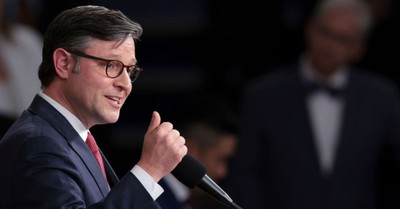Some Kind of Weird Tyranny
- James Tonkowich ReligionToday.com Columnist
- Published Aug 02, 2013

“It's some kind of weird anarchy,” my friend commented. Would that it was some kind of weird anarchy, but it’s not. It’s some kind of weird tyranny.
Runnymede is a field in Surry. It sits on the Thames River about 20 miles west of London. In that field in 1215, 40 English barons seeking to avert a civil war pressured King John into approving the Magna Carta.
While the document was quickly ruled null and void, nonetheless the Magna Carta was the first step on the Anglo-American journey toward constitutional democracy.
King John, from the barons’ point of view, was a tyrant. It wasn’t so much that he put himself “above the law,” but that he believed the king was the law and that he was free to do as he pleased.
In sealing the Magna Carta, King John at least pretended to agree with the baron that the idea that the king is the law was fundamentally wrong. Nations should be governed instead by the principle that the law is king, what we call the rule of law. And because the law is king, even the king must obey the law thus preventing the king from becoming a tyrant.
The Magna Carta didn’t actually prevent civil war in 1215, but with it the train left the station. The Magna Carta would be republished after King John’s death and a number of updated versions appeared later on influencing, among other things, the American founding.
The founders understood that each of us has an inner tyrant waiting to dominate others and bend their wills to ours. Christians know this as the doctrine of original sin and most of us experience it to a greater or lesser extent whenever we don’t get our way and whenever we run into one of many of petty tyrants who plague our lives.
Writing in The Federalist 51, James Madison observed, “But what is government itself, but the greatest of all reflections on human nature? If men were angels, no government would be necessary. If angels were to govern men, neither external nor internal controls on government would be necessary. In framing a government which is to be administered by men over men, the great difficulty lies in this: you must first enable the government to control the governed; and in the next place oblige it to control itself. A dependence on the people is, no doubt, the primary control on the government; but experience has taught mankind the necessity of auxiliary precautions.”
Those “auxiliary precautions” are the rule of law expressed in the separation of power written into the Constitution. The executive branch (the president) may not make laws. Its job is to uphold laws. The judicial branch (the courts) may not make laws though it may strike them down as unconstitutional. Its job is to make judgments about the application of laws. Only the legislative branch (Congress) is entrusted with making, repealing, and amending our laws.
Or at least that’s what Madison et. al. had in mind. They constructed the Constitution to protect the rule of law rather than the rule of men — be they kings, governors, or presidents.
But it is precisely the rule of law that is currently under threat.
While the Defense of Marriage Act (DOMA) was recently overturned by the Supreme Court, long before that happened, Attorney General Eric Holder announced that the Obama Justice Department would not defend DOMA and with it one-man-one-woman marriage even though defending the laws enacted by Congress is the Justice Department’s job. Now, after the Supreme Court DOMA and Proposition 8 decisions, several state Attorneys General have announced that they will not defend their state’s marriage laws.
And that’s what prompted my friend to comment, “It's some kind of weird anarchy.” But it’s not. It’s a rejection of the rule of law and an embrace of the rule of individuals who, based on their private judgment feel free to pick and choose among laws. And if they have the power to get away with it, they will. King John would probably have been pleased.
Western civilization, prosperity and legitimacy are built on the rule of law. That rule has never been perfect — the tyrant in each of us sees to that. But our strength lies in large measure in passing and enforcing just laws that are then obeyed because it’s the law.






















